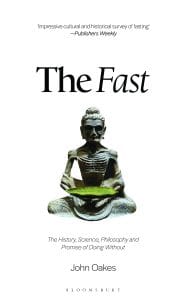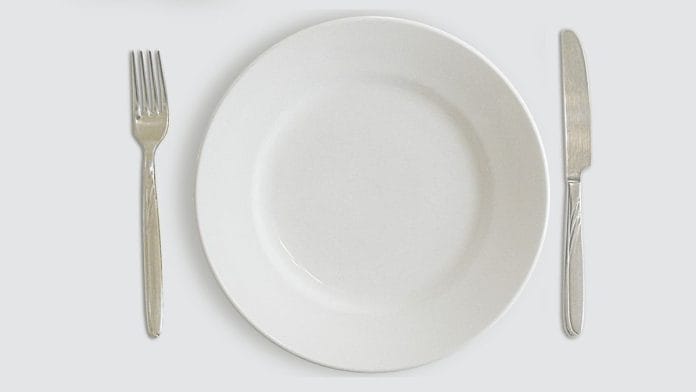For anyone who embarks on a fast—whether for moral, political, or healthrelated reasons—the process marks a break in the consumerist narrative, a small but potent rebellion against the inflexible demarcation of our days formed by the steady lockstep march of breakfast, lunch, and dinner. Indoctrination for this regimen begins before we are self-aware. Beginning in the late nineteenth century, instead of feeding infants when they were hungry, breastfeeding mothers were instructed to follow feeding schedules “as rigid as railway timetables.” To a large degree, our meals define our lives.
The faster refuses such direction. The act of fasting is symptomatic of a Bartleby-like decision to refuse reasonable behavior. It won’t stop routine, but impedes it for a bit, signifying a shift and a determined unwillingness to follow standard operating procedure. In its striving toward self-improvement, the fast evokes both St. Paul (“Work out your own salvation with fear and trembling”) and the last words of Buddha (“Decay is inherent in all component things. Work out your salvation with diligence”). Fasting signals precedence of mind over matter, demanding careful assessment of the most normal of acts. And because it takes place over an extended period, fasting demands some measure of commitment.
In another sense, fasting allows for room in our bodies, for the inclusion of something new, and for the acceptance of emptiness. It cultivates the presence of an absence. After a time, this absence of food (food that in the normal course of things is first a necessity, then a comfort, then a luxury) enables us to focus on other, less material things. Fasting reveals itself as an exploration of borders and barriers. As Weil understood, with reference to Plato’s concept of metaxu (“between” spaces), barriers imply connection: “Two prisoners whose cells adjoin communicate by knocking on the wall. The wall is the thing which separates them but it is also their means of communication. . . . Every separation is a link.” The meditative experience induced by long-term fasting links humans who seek to focus on what is relevant and essential the world over and across millennia. Fasting’s effects are replicated in the Hasidic process of hitbodedut, or “self-seclusion”—a search for inner stillness, a fast from the presence of others—as it is in the more common meditation espoused by Buddhist and Hindu teachings. In Arabic, the modern word for fasting is etymologically associated with “standing still.” In English, volume XVI of the Oxford English Dictionary connects “starve” and “stare”—both are credited with possible origins in starren, Old High German for “to be rigid.” Like staring and starving, fasting involves stillness. If you are “steadfast,” you resist. You are strong and you endure.
Is fasting reserved for a select few? I am not particularly fit, as suggested earlier. Anyone in reasonably good shape can go on a fast. There is nothing to boast about here (besides as St. Jerome says—boasting about fasting is reprehensible). But as fasting comes back into the mainstream discourse, both as part of a focus on well-being and as a reaction to consumerism, it’s worth reconsidering its value and its roots. Fasting reminds us of the virtues of paring back, of not consuming all that we can. There are few more timely messages.
Also read: Why Ambujammal hid her pearl necklace when Gandhi came to her house
Is it a mark of privilege to fast? Once, it would have been impossible to associate fasting with self-indulgence, but now it has become entwined with self-obsession. Many see fasting as a signifier of luxury, a paradoxical indication of excess. You can only surrender what you already have, as the Greek philosopher Diogenes of Sinope is reported to have observed two millennia ago.
Fasting can be a great unifier, an instant leveler that connects us purely by virtue of being an act accessible to all. This shared experience is another reason that fasting has been adopted by religions and political movements all over the world. Notably, places marked by devastating famine are also often home to ancient fasting traditions. Cultures most commonly associated with fasting include those of Ireland, India, and Ethiopia, where devout Coptic Christians fast intermittently up to 210 days a year. This is not to suggest that the world does not suffer from hunger. In the words of philosophers and fasting advocates Eva Lerat and Sébastien Charbonnier, “malnutrition and starvation are scourges largely orchestrated by our society of overconsumption and profit, and our thinking cannot in any way allow us to minimize the suffering and damage that this entails.” In a society where, by some measures, the largest single component of landfills is food waste and where one-third of all food is lost or wasted, focusing for a time on what we consume versus what we need to consume seems like a perennially beneficial exercise.
The choice to fast is more easily made if you know there will again be food on the other side of the experience. But to my mind, fasting is a sign of strength rather than privilege—a subtle difference, to be sure. A decision to put a hold on eating doesn’t necessarily indicate a surfeit of food. It only means the choice has been made not to eat. That decision is what I intend to explore.
Somewhere in his Book of Five Rings, the seventeenth-century swordsman Miyamoto Musashi writes that an effective warrior moves like a stream that flows over and around rocks. Although I am no warrior, to me, a self-imposed fast—even one that is not followed to the point of no return—is not dissimilar. It is a graceful way to confront immutable circumstance amid the constant battle of existence that sweeps us along. Although it is a distant cousin to suicide in that it is self-abnegation—a willful step away from continuing as things have been and turning one’s face toward finality—limited fasting is closer to what the French call the “little death” of post-orgasm. It is a resetting of consciousness. Given time, the effects largely dissipate: it’s more like a haircut (which is also a flirtation with instruments that could be deadly) than a permanent makeover.
Wellness and weight-loss culture often seem bound up in vanity. Susan Sontag wrote that to think only of oneself is to think of death. Self-obsession means a relentless focus on the decay our bodies inevitably undergo. And while, of course, we all need self-care, the wellness movement’s connection with buying things means it requires dependence on materiality that looks suspiciously like an outgrowth of capitalism. The standard interpretation of the modern mantra “Be kind to yourself ” is to stuff yourself and go out and buy things. A prolonged fast, on the other hand, lacks any gimmickry. Fasting demands only your own agency, and it strangely requires the temporary abandonment of what we think we need. It inverts self-obsession, as though the act itself were some kind of Klein bottle—that weirdly impossible object lesson in physics where the outside is inside and vice versa.
By turning our gaze inward, focusing on the most mundane physical acts over a set period, fasting enables its practitioners to approach, if not achieve, self-erasure—and at the same time, achieve self-empowerment, in an affirmation of the right and ability to self-direction. Even if you fast together with a partner, the act sets you apart. No one else, nothing else is required. There is nothing to exchange but ideas. Not everyone is equipped to benefit from the fasting experience. But fasting’s principles, and what it sparks and what it confronts, are worth everyone’s consideration.
 This excerpt from ‘The Fast’ by John Oakes has been published with permission from Bloomsbury Publishing.
This excerpt from ‘The Fast’ by John Oakes has been published with permission from Bloomsbury Publishing.






